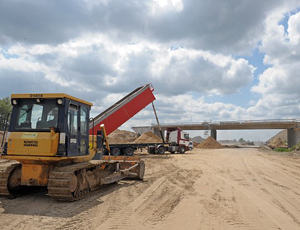Poland's decision on June 13 to cancel the contract with Chinese Overseas Engineering Group (COVEC), a subsidiary of the state-owned China Railway Engineering Corp., to build a 50-km (31-mile) stretch of the key east-west A2 Highway has dealt a blow to Chinese ambitions to break into the lucrative European construction market.

COVEC was awarded the contract in late 2009 after submitting a bid of $447 million, more than 50% below the project's budgeted cost, making it the first Chinese company to win such a large project in Europe. The decision to award the contract to a Chinese state-owned firm surprised many, in light of what observers considered the Polish government's almost fundamentalist commitment to a free market since the fall of communist rule in 1989.
At the time, the industry advocacy group for Poland's transportation contractors, OIGD, charged that China was buying its way into the European infrastructure market by underpricing its bids. The group submitted a letter to European Commission chief Jose Manuel Barroso, claiming unfair competition and alleging that Beijing was helping Chinese firms skew foreign markets. OIGD urged the commission to take anti-dumping measures against COVEC but no action was taken.
The A2 highway links the Polish capital of Warsaw and Berlin, the German capital. The 2009 tender for the 50-km segment from Warsaw to the German border formed part of Poland's drive to upgrade its infrastructure in time to co-host the 2012 European football championships.
But work on the highway halted in May when COVEC failed to pay its Polish partners, and an ultimatum set by Warsaw to resume operations went unmet.
COVEC claimed that the highway's actual cost would reach $786 million, 76% more than budgeted, due to higher-than-expected construction standards and the soaring cost of building materials. COVEC’s attempts to renegotiate contract terms failed, leading Poland's General Directorate of National Roads and Motorways to cancel the contract. The agency is demanding compensation of $271 million from COVEC at the same time the Chinese firm is claiming compensation from its Polish partner.
Andrzej Maciejewski, deputy directorate head, told reporters that the agency would restart the process of seeking investors for the A2 highway, and resume work in July. "We want the road to be traversable in late May 2012," he said.
But only one of 16 companies approached by the Polish government seems ready to fulfill all requirements to complete one of the A2 sections abandoned by the Chinese, according to published reports in Poland. They claim that only Eurovia Polska, a Polish subsidiary of Paris-based contractor Vinci, accepted all the conditions and agreed to complete the first 30 km-long section. Eurovia has said that the section will be ready for traffic by May 2012. However, the highway's second section has yet to attract any takers. The roads directorate has not issued an official statement regarding the new contracts.
The China International Contractors Association responded to the contract cancellation with a statement that "enterprises should try to become familiar with international law and the market environment in foreign countries when expanding abroad." The state-controlled People's Daily was reporting that COVEC had decided to terminate the contract because it was treated unfairly by the Polish authorities.
 |
| TODINI |
"The EU and national politicians must ensure that another disaster like the case of COVEC in Poland does not happen again," FIEC President Luisa Todini told a group gathering on June 16. "I hope it has been shown once and for all that the race to the bottom on price does not deliver the best deal for taxpayers and will not lead to the kind of construction industry, fit for the future, that we want to have in Europe. Todini is an executive of Todini Costruzioni Generali SpA, Rome.

Post a comment to this article
Report Abusive Comment